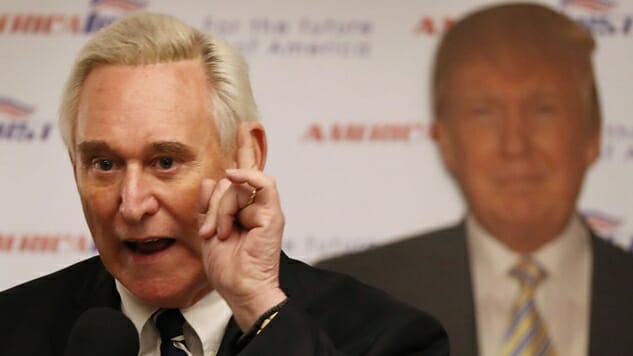The Kremlin’s Man: Donald Trump’s FISA Paranoia (Part 4 of 5)
Photo by Joe Raedle/Getty
On Saturday morning, March 4th, the President of the United States took to Twitter and set off a firestorm that still engulfs his administration to this day. Over the course of 17 minutes that may come to define his presidency, Trump sent four tweets accusing President Obama of doing something that if it were true, would either be perhaps the most scandalous illegal action in the history of the presidency, or concrete proof that Donald Trump can very clearly be tied to the Russian government, with no in-between.
Terrible! Just found out that Obama had my “wires tapped” in Trump Tower just before the victory. Nothing found. This is McCarthyism!
— Donald J. Trump (@realDonaldTrump) March 4, 2017
How low has President Obama gone to tapp my phones during the very sacred election process. This is Nixon/Watergate. Bad (or sick) guy!
— Donald J. Trump (@realDonaldTrump) March 4, 2017
Literally everyone has said this claim is utterly ridiculous—ranging from the entire intelligence community to a member of his own transition team. The Chair of the House Intelligence committee, Devin Nunes, self-immolated yesterday when he sprinted in front of cameras to reveal what is likely classified information, and claimed that Trump was unmasked in incidental collection during surveillance of other FISA targets. He provided the best evidence yet that we need an independent commission on this subject.
Where Trump seemed to get this idea that he was specifically targeted came from a Breitbart article that repurposed some reporting by other outlets and extrapolated it to some wild conclusions. That reporting is not good for Donald Trump, and any rational person would see that drawing attention to it is the last thing you’d want to do. If Trump really is engaged in some shenanigans with the Russians, we may look back at these tweets as the largest unforced error in the history of the presidency.
The BBC, The Guardian, and McClatchy have all corroborated some portion of Louise Mensch’s initial report in Heat Street, which alleged that “two separate sources with links to the counter-intelligence community have confirmed to Heat Street that the FBI sought, and was granted, a FISA court warrant in October, giving counter-intelligence permission to examine the activities of ‘U.S. persons’ in Donald Trump‘s campaign with ties to Russia.”
Despite the fact that the FISA court has an unwarranted reputation for doling out rubber stamps to every request it gets, this is an extraordinary claim. While it is true that FISA does confirm the vast majority of requests that come its way, that is largely due to the fact that an application to the court can be withdrawn at any moment, so a request that would get struck down almost never gets that opportunity. It’s like walking into your final with a failing grade, withdrawing from the class, and getting an incomplete grade instead. This report by Mensch didn’t draw much attention until later reports from more established sources corroborated this former British MP-turned journalist’s writings.
The Guardian reported that the “FBI applied for a warrant from the foreign intelligence surveillance (Fisa) court over the summer in order to monitor four members of the Trump team suspected of irregular contacts with Russian officials. The Fisa court turned down the application asking FBI counter-intelligence investigators to narrow its focus.” While they initially said that they could not verify Mensch’s claim that the warrant in October was approved, they did after later reports corroborated her story.
Paul Wood of the BBC issued one of these reports, as he said that lawyers from the National Security Division in the Department of Justice submitted an application to “intercept the electronic records from two Russian banks.” After getting rejected in June and July, Wood reported that the request was approved in October. However, the central difference between Wood and Mensch’s reporting is that Wood claims that this FISA request has always centered on these two Russian banks, while Mensch said the initial request explicitly named Trump. Mensch tends to start with solid facts on this topic and then takes them to wild conclusions—like her belief that Vladimir Putin murdered Andrew Breitbart to make way for Steve Bannon—so her claims do need to be taken into consideration with more than a few grains of salt.
It was Mensch’s report that was included in this Breitbart article which set off Trump’s tweets that fateful Saturday morning, and that is likely where he came up with the idea that former President Obama tried to “tapp” his phones specifically. Ironically enough, in propagating this bullshit theory, Trump drew attention to one that is much more rooted in reality. Given that three separate journalistic institutions have all corroborated portions of Mensch’s initial story, plus James Comey’s historic confirmation that there is an ongoing investigation into people around Trump (plus Nunes’ bizarre admission yesterday that there are “multiple FISA warrants” involving Trump), there does seem to be something to these reports that America’s most infamous secret court is spreading its tentacles across the globe in an attempt to trace evidence back to Team Trump.
According to the BBC, “Last April, the CIA director was shown intelligence that worried him. It was—allegedly—a tape recording of a conversation about money from the Kremlin going into the US presidential campaign.” This is reportedly what set off the FISA request(s). For what it’s worth, John Schindler, a former NSA analyst, said the same thing on Twitter.
What makes this all confusing is not just trying to deduce the mechanisms of a secret court that most reporters covering it don’t quite understand, but that various reports have named different targets of this investigation. The BBC claims these are targeted at banks, while Mensch and The Guardian allege that the initial FISA requests were aimed at up to four members of Team Trump, while McClatchy only reports that the investigation is focused on “how money may have moved from the Kremlin to covertly help Trump win.” Devin Nunes even told Chris Wallace of Fox News that one person working in the White House is currently under surveillance.
Huh? Devin Nunes says of “people working at the White House now,” none are under intel investigation or surveillance “but one.” pic.twitter.com/9lxN79cbgl
— Tommy Christopher (@tommyxtopher) March 19, 2017
If we take a step back and look at the full picture, while taking into account Mike Rodgers’ and James Comey’s testimony in front of Congress on Monday, a fairly simplistic picture emerges. The Russians were caught on tape bragging about access to Trump, and an investigation into both sides of that alleged transaction began. Whether it is focused on members of Trump’s team or the Kremlin is secondary to the fact that they are the targets of a larger investigation that encompasses them both.
So with that said, let’s investigate some citizens of Trumplandia based on reporting and their own statements about their ties to Russia—ranked from least to most likely as potentially being prime subjects of the FBI’s investigation.
Donald Trump Jr.
Given the timing of his meeting in question and the general role of Trump Jr., it’s unlikely that he would be a target of an investigation, but he certainly gave them one big reason to. Three weeks before election day, he traveled to Paris to meet with the Center for Political and Foreign Affairs. If there’s one thing I’ve learned while covering government operations, it’s that anything with a name as bland and non-descriptive as that is anything but. The CPFA is a pro-Russian group founded by wealthy French businessman Fabien Baussart and Randa Kassis, who reportedly have major investments in Russia. Donald Trump Jr. was paid $50,000 to fly to Paris and allow himself to be lobbied by this group.
Paddy Ashdown, a British politician and former leader of the Liberal Democrats, initially accepted the CPFA’s invitation to join Trump Jr. and roughly 30 others at this event before canceling. Ashdown told ABC News in an e-mail that “it was clearly an attempt to instrumentalize me for their own very dubious purposes. I told them I wasn’t born yesterday and that the Serbs used to try that and didn’t succeed, and they were probably cleverer. Result: The engagement was canceled, along with the ‘peace talks.’”
The “peace talks” that Ashdown is referring to? Randa Kassis, an ally of Bashar al-Assad, elaborated on her Facebook page a few days after Trump’s election.
Baussart is relatively unknown, but one source refers to her as a lobbyist for oligarchs in Russia. Daniel S. Hamilton, the executive director of the Center for Transatlantic Relations at the Johns Hopkins Schools of Advanced International Studies told ABC News that “I have been dealing with French think tanks and research institutes for 35 years, and I’ve never heard of it [CPFA]. That tells you something.”
Michael Cohen
According to the infamous dossier compiled by former MI6 agent Christopher Steele, Donald Trump‘s lawyer, Michael Cohen, was in Prauge in August of last year to pay off Russian hackers. Cohen told The Atlantic that he was in Los Angeles from August 23rd to August 29th during the campaign. This is an easily provable lie. How do I know? I went through every single one of his tweets from the month of August (and yes, I have far less brain cells than when I started), and his own actions contradict himself.
He tweets A LOT—almost always between the hours of 6 am and 8 am EST, and then later that day from 10 pm EST to nearly midnight (his TV appearances shift the hours a bit but he clearly makes time in the morning and at night to go bananas). I would venture to guess that 99% of his tweets are geotagged from Manhattan, presumably meaning they are sent from his office in Trump Tower (geotagging means that Twitter can establish the exact location from where the tweet was sent using your IP address).
Weekends are a bit more subdued, but you can typically tell that he’s putting in a full day of work when he sticks to his 6-8 and 10-midnight tweeting habit. Saturday August 13th and Sunday the 14th were two such examples where he stuck to a regular schedule, whereas the last weekend in August was relatively quiet, but it is the weekend in between those two which raises suspicions. Between Saturday and Sunday, the 20th and 21st, he did not tweet and only retweeted four tweets. That alone isn’t anything too outside the norm, although he typically tries to reply to as many people who tweet at him as possible (always with a period in front of the @ sign so everyone can see his reply).
What raises alarm bells is the relative inactivity the following work days, combined with the fact that the few tweets he did send out were not geotagged, unlike nearly every single one from the entire month of August and beyond.
Congrats @empirereportny on being featured in The Daily News. Great political daily read. https://t.co/8RPtolTjGMhttps://t.co/RtytWcP5Bj
— Michael Cohen (@MichaelCohen212) August 22, 2016
Twitter automatically turns off geotagging when tweeting from your phone, so my theory is that these non-geotagged tweets came as he was away from a computer. But again, this inactivity that does not align with his usual schedule is nothing nefarious…until you get to this geotagged tweet on the 24th. Simple question, if Michael Cohen was supposedly in Los Angeles from August 23rd to August 29th, how the hell are these tweets from the 24th tagged from Elizabeth, New Jersey?
.@catarinajoao um…everyone…the newspapers…says me
— Michael Cohen (@MichaelCohen212) August 24, 2016
.@HoustonWelder@sobernhappy@bocavista2016@HeavySan thank you…I’m flattered!
— Michael Cohen (@MichaelCohen212) August 24, 2016
He has tweets tagged from Los Angeles later that day, which further complicates his assertion that he was in LA the day before. And that’s not the only verified account that gives credence to the unverified allegations in the dossier. Yevgeniy Nikulin—an infamous Russian hacker—was arrested in Prague three days before the Obama Administration formally accused the Russian government of stealing e-mails from the DNC.
So to recap, a dossier that members of the intelligence community say does have some merit places Cohen in Prague in August to meet with a hacker, and we have him caught in a lie about his whereabouts in August, with his activity preceding the day in question being wildly subdued compared to his normal hyper-activity, and a couple months after this, the United States arrested a notorious Russian hacker in the city in question.
Cohen also told The New York Times that he delivered the Ukrainian peace plan to Michael Flynn, told The Washington Post that he “emphatically denies” ever delivering the plan to Flynn, told Business Insider that he denies “even knowing what the plan is,” and told NBC News that even if he had taken the plan to the White House “so what? What’s wrong with that?”
I don’t know about you, but if I worked for the FBI, I’d sure have some questions for one of Donald Trump‘s closest confidants. Despite these obvious lies that center around the Russia question, he doesn’t even make it into the top tier of the four people who may be the focus of a federal investigation.







































